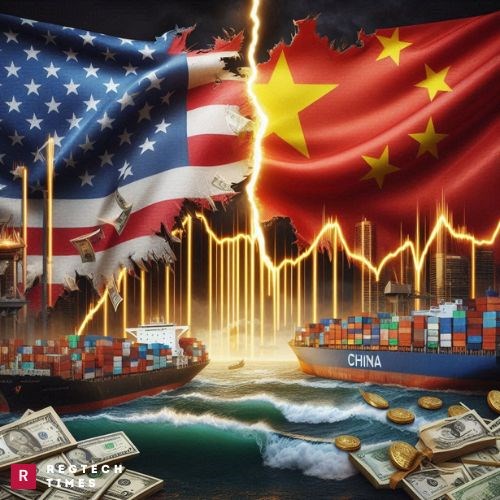
16-Apr-2025 , Updated on 8/17/2025 11:55:57 AM
Trump tariffs : China warns of trade war
China’s Firm Response to Tariffs
China gives a clear signal against economic coercion through its reaction to Trump’s tariffs. The warning of the trade war signifies that Beijing was not ready to bow to one-sided policies that affected the Chinese economy. In history, trade liberalization policies have illustrated that protectionism does not provide sustainable benefits, but leads to retribution and flounderment of world markets. However, the approach of China is more or less defensive though it’s not passive as it seeks to safeguard its markets while at the same time putting the spotlight on aggressive international trade policies. Thus, escalation benefits no one, and in response to Beijing’s interventions, it is easier to call for fair negotiations instead of demanding an ultimatum.
Tariffs Risk Global Economic Stability
Donald Trump continuing with his trade tariffs policy is posing a potential threat to global economy volatility. This is because the U.S. forces China to take measures that will cause it to break the links that link it to other countries hence escalating the prices of goods beyond the reach of many consumers. Tariff wars diminish the confidence level hence reduces on foreign investments, and this slows down the growth of the two economies. It is not a threat but a statement of fact meant to showcase the amount of damage that could soon be expected. If not well managed, these policies may lead to an economic war that would affect both the countries’ businesses and citizens in the wider sense. As for treatment, the overall strategy must be cooperation, and not confrontation is the only way that the patient can minimize the risk of further injury.
Unilateral Policies Undermine Trade Trust
These measures are usually in the form of a unilateral tariff that only benefits the home country while violating the principles of goodwill and trust in the trading systems. Certainly, China’s actions show that there are consequences for turning our back on multilateral processes and relying on the power play instead. The trade strategy of the US fails to understand that globalization has brought about web-like interconnectivity that ends up hurting more departments and countries. This threat from China is an authoritative justification of the fair trade system as a counteraction to policies that mean domination. It is therefore a pity that whenever there is no mutual respect in trade relations, the thing turns to the worse, and both parties end up being worse off. It is not helpful to force an economic agenda for sustainability which ignores the grievances of the people.
China’s Strategic Economic Resilience
China is in a good position to cope with the tariffs, which decreases the impact of the leverage for the United States. Because it has a huge domestic market and various trade relations, Beijing has the ability to respond to short-term fluctuations and develop countermeasures at the same time. Therefore, the prospects of a trade war, and its probability are indicative of China’s confidence in its economic power and long-term plan. However, the current China has relatively more bargaining power, and that is why blunt tariffs may not act effectively as before. UN diplomats must understand that threats and historical tactics of the U.S. won’t compel the nation to agree, innovative decisions sooner or later will work.
Dialogue Over Economic Confrontation
Aristotle’s Vilna vision of change is that the only way out is through negotiation not aggression. Trade wars are a detrimental aspect of international relations since they consume much resources, push the relations between countries to the brink, and also negatively affect the common people. The words coming from China should be viewed as a signal where the U.S. needs to steer clear of protectionism policies that signify a failure. Positive means will provide an answer to the conflict and guarantee the stability of development. In history, it is seen that people prosper best when they work together and not when they are forced to work. In the end, it will be the American and Mexican economies and the world at large that will suffer the consequences of the high tariff approach.

Content Writer
Hi, I’m Meet Patel, a B.Com graduate and passionate content writer skilled in crafting engaging, impactful content for blogs, social media, and marketing.
Comments
Join Our Newsletter
Subscribe to our newsletter to receive emails about new views posts, releases and updates.
Copyright 2010 - 2026 MindStick Software Pvt. Ltd. All Rights Reserved Privacy Policy | Terms & Conditions | Cookie Policy